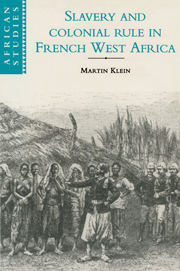Book contents
- Frontmatter
- Contents
- List of illustrations
- List of maps
- List of tables
- Preface
- List of abbreviations
- Glossary
- 1 Slavery in the Western Sudan
- 2 Abolition and retreat. Senegal 1848–1876
- 3 Slavery, slave-trading and social revolution
- 4 Senegal after Brière
- 5 Conquest of the Sudan: Desbordes to Archinard
- 6 Senegal in the 1890s
- 7 The end of the conquest
- 8 The imposition of metropolitan priorities on slavery
- 9 With smoke and mirrors: slavery and the conquest of Guinea
- 10 The Banamba Exodus
- 11 French fears and the limits to an emancipation policy
- 12 Looking for the tracks. How they did it
- 13 After the War: renegotiating social relations
- 14 A question of honor
- Appendixes
- Notes
- Bibliography
- Index
- Titles in the series
5 - Conquest of the Sudan: Desbordes to Archinard
Published online by Cambridge University Press: 07 May 2010
- Frontmatter
- Contents
- List of illustrations
- List of maps
- List of tables
- Preface
- List of abbreviations
- Glossary
- 1 Slavery in the Western Sudan
- 2 Abolition and retreat. Senegal 1848–1876
- 3 Slavery, slave-trading and social revolution
- 4 Senegal after Brière
- 5 Conquest of the Sudan: Desbordes to Archinard
- 6 Senegal in the 1890s
- 7 The end of the conquest
- 8 The imposition of metropolitan priorities on slavery
- 9 With smoke and mirrors: slavery and the conquest of Guinea
- 10 The Banamba Exodus
- 11 French fears and the limits to an emancipation policy
- 12 Looking for the tracks. How they did it
- 13 After the War: renegotiating social relations
- 14 A question of honor
- Appendixes
- Notes
- Bibliography
- Index
- Titles in the series
Summary
… the slave trade constitutes a majority of the transactions in these unfortunate countries.
Gallieni on Sudan (1885)On the day when everyone is free the first act will be the cessation of work, famine will follow, then pillage and a return to the state of perpetual revolution from which we have pulled this country. Only the slave safeguards our situation; armed with primitive tools, he works little but in a continuous manner.
Commandant, Bafulabe (1894)From the first, the Sudan was different from Senegal. It was a military fief and remained so for a generation. There were no concrete economic interests, only vague and illusory hopes. There was no French community. Information about the military and its operations there came only from the military. The Sudan was insulated from French politics and its would-be conquerors were determined to keep it that way. The only non-military group of any substance was the missions, but they supported colonialism and rarely went public when they disapproved of policies pursued by the military. The exercise of power was thus unrestrained by either political opposition or civilian morality. Commandants often made their own policy and ignored instructions from political superiors.
The conquest of the Sudan also responded to no clear imperative of the French economy. At least one military commander, Frey, saw this. The only lucrative commerce, he wrote, was that of slaves. The Sudan was “a country without resources,” underpopulated and without any future prospects. To the degree that the military tried to rationalize what they were doing, they did so in terms of poor market research.
- Type
- Chapter
- Information
- Slavery and Colonial Rule in French West Africa , pp. 77 - 93Publisher: Cambridge University PressPrint publication year: 1998

